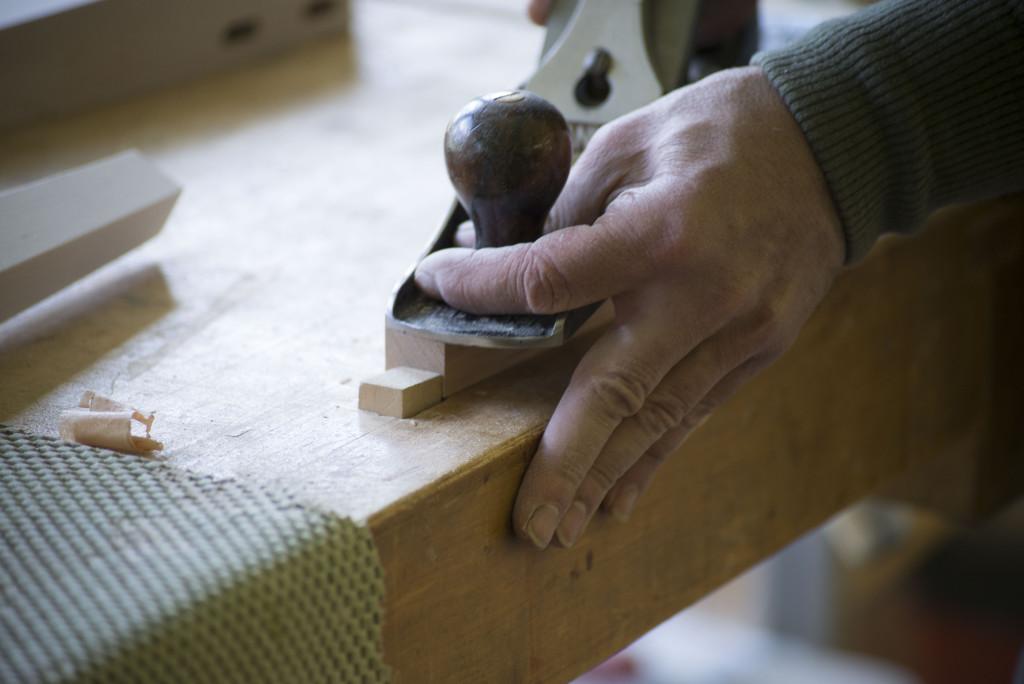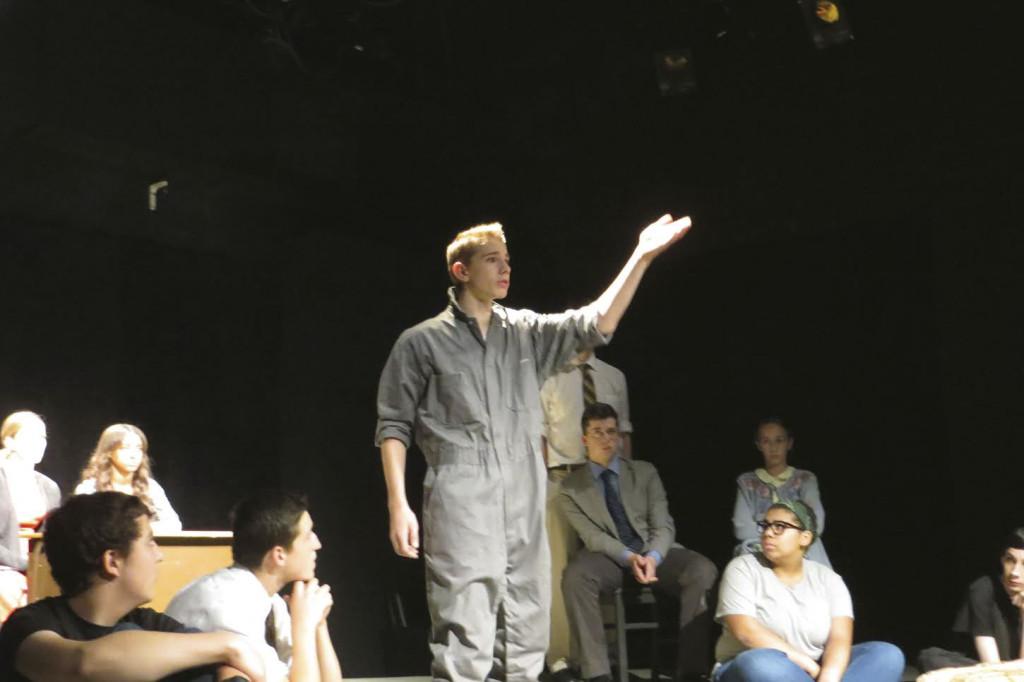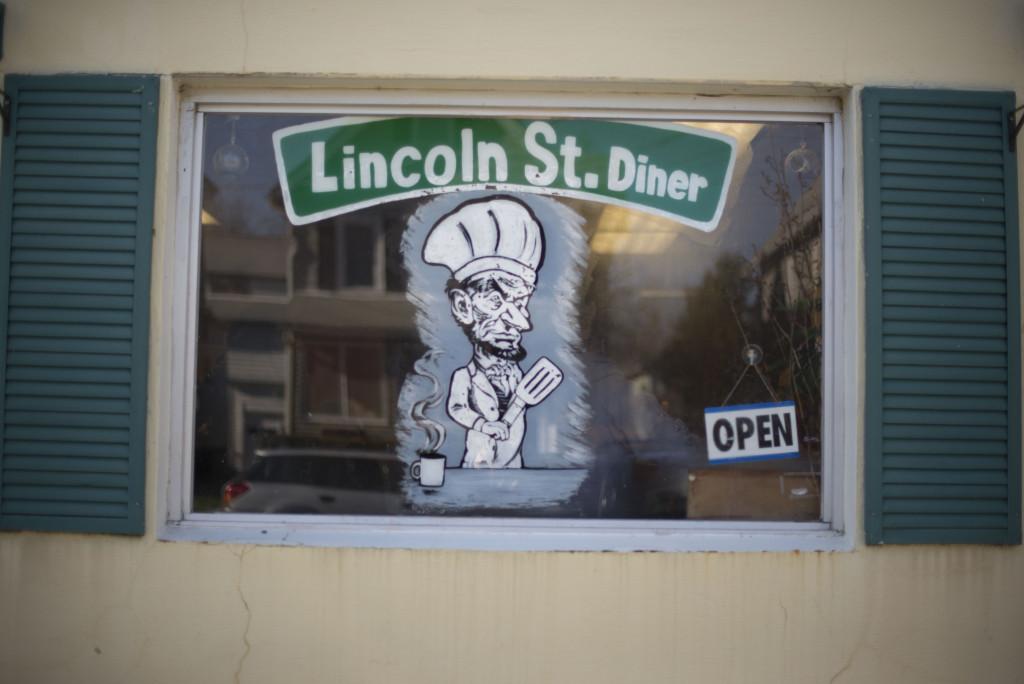A snow-covered driveway, with no sign of shovel or plow, sits near the intersection of Harford and Canaan Roads in Brooktondale, New York. A maroon Ford pickup is parked outside a cedar-sided, solar-paneled workshop. It’s quiet, as per usual. A large German shepherd mix dog bounds through the snow, bone in mouth, tail wagging ferociously as he goes. The faint outline of footprints that lie beside the truck lead to the frosted glass French door of Wolff & Nagel Furniture.
The room is bright; large windows border the west side of the shop. The reflection of the sun on the snow illuminates the room. Snow falls, moving eerily in the steady wind. It seems to be accumulating quickly; blanketing the tracks the dog has left surrounding the exterior.
The dog, Blue, frolics in the snow, now pushing a red rubber kickball with his nose. The snow beneath his feet kicks up, creating a brief cloudy tornado around him. Tall grass peaks out from beneath the heavy snow, begging for a bit of the light emitting from the sun.
The workshop’s structure is open, with only a couple of columns supporting the ceiling. It is long, with doors at either end. The walls are the color of butter, but aren’t very visible. Almost every open space is covered with shelving units or cabinets. Pieces of wood of every length and thickness lean against the walls.
The ceiling is a maze of silver piping of various thicknesses. A low hum emits from the piping as Jim feeds a piece of maple through the planer. The tubing connects to plastic, ridged tubes fastened to a hole on the planer to catch the scraps. A roar interrupts the hum as Jim, in an orange flannelled shirt, Levi’s and work boots, pushes the wood through as it makes contact with the razor-sharp blade. A few fine curls of the ivory wood shavings fly free, catching in Jim’s salt-and-pepper hair. He adjusts the round, Harry Potter–type glasses sitting on the bridge of his nose and rubs his scruffy unshaven face. He moves his hand to rub the back of his head as he examines the piece as it finally comes through the opposite end of the machine.
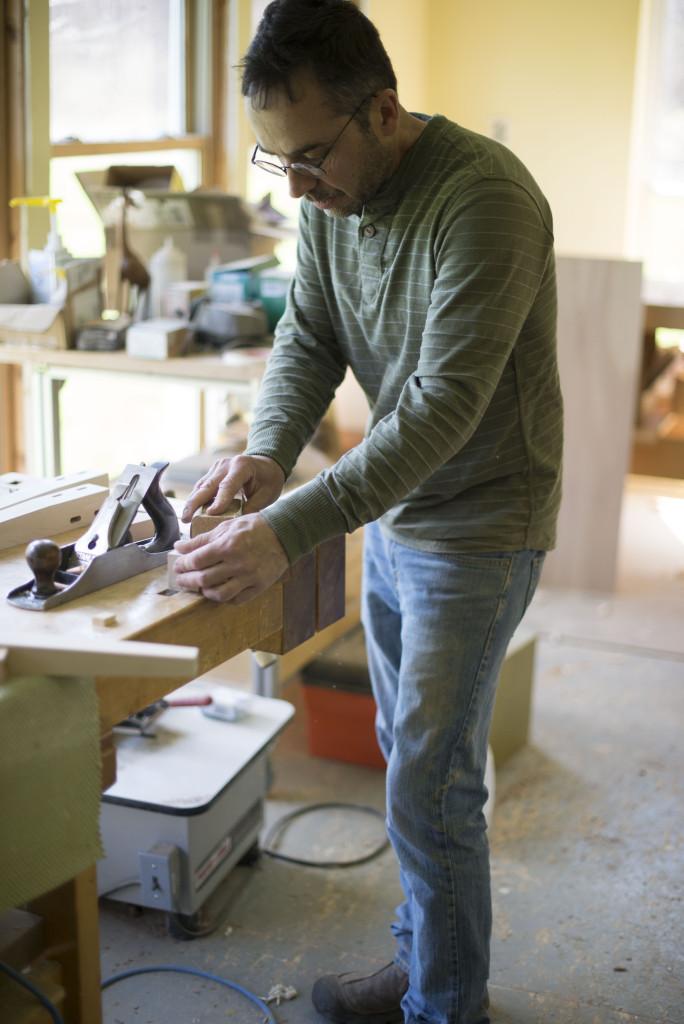
The room smells strongly of wood. Not a particular type, but a mix of many. Every surface is covered with layers of dust. The dust varies. Some are golden flakes; others resemble a reddish confectioners’ sugar, while some are splintered, ideal for kindling.
The creak of a pullout stairway leading to an attic interrupts the hum. The rattle of the makeshift staircase echoes as Jim brings a collection of items to the overhead storage.
The black shelves against the wall hold cardboard boxes of varying sizes. Cobwebs cover the corners, and a layer of fine dust settles on top of each box. They are labeled with a black Sharpie: “Lamp Parts,” “Tree Swing,” “Dog Bones” and “Edge Sander.”
Jim moves about the space methodically, organizing and cleaning some of the mess. A workbench full of pieces, parts and tools sits near the back. He wraps the cord of a palm sander that was sitting atop an old newspaper before wiping the excess glue from some plastic bottles originally intended for ketchup, not the cream-colored adhesive that fills them now.
He approaches a stereo system and switches on the radio. Classical music plays in the background before fading to a voice: “This is Morning Edition from NPR News.”
He then begins to remove the dust from the floor. There’s a certain rhythm to his task, demonstrating he’s done this many times before.
[block]Sweep the floor.
Shake out the broom.
Smack the dustpan against the bin.
Sweep.
Shake.
Smack.[/block]
The only time this place was dust-free was the day it was built in the late 1990s.
Jim pats his calloused hands together, removing any of the remaining dust, satisfied with the job now complete.
He now grabs a packaged band sawblade, breaking open the plastic to remove it. The blade springs dangerously as it uncoils itself, bouncing as it takes new shape. Fine pointed teeth mark one side while a straight edge borders the other. Jim doesn’t even flinch, he’s confident in his ability to complete the chore safely.
With one hand, he opens the band saw’s front-facing panel with a snap; he removes the dulled, shine-less blade that sits there, disposing of it in a nearby garbage bin. In the other hand he holds the new blade, manipulating it into place. He closes the panel and pushes the power button to ensure it functions properly. The machine comes to life, the blade rotating cyclically just as it should.
Blue approaches the back door. Looking straight into the window, he begins to bark, moving his nose up in the air as the sound penetrates the window. Jim notices his canine’s plea, stops what he’s doing and lets the dog into his shop.
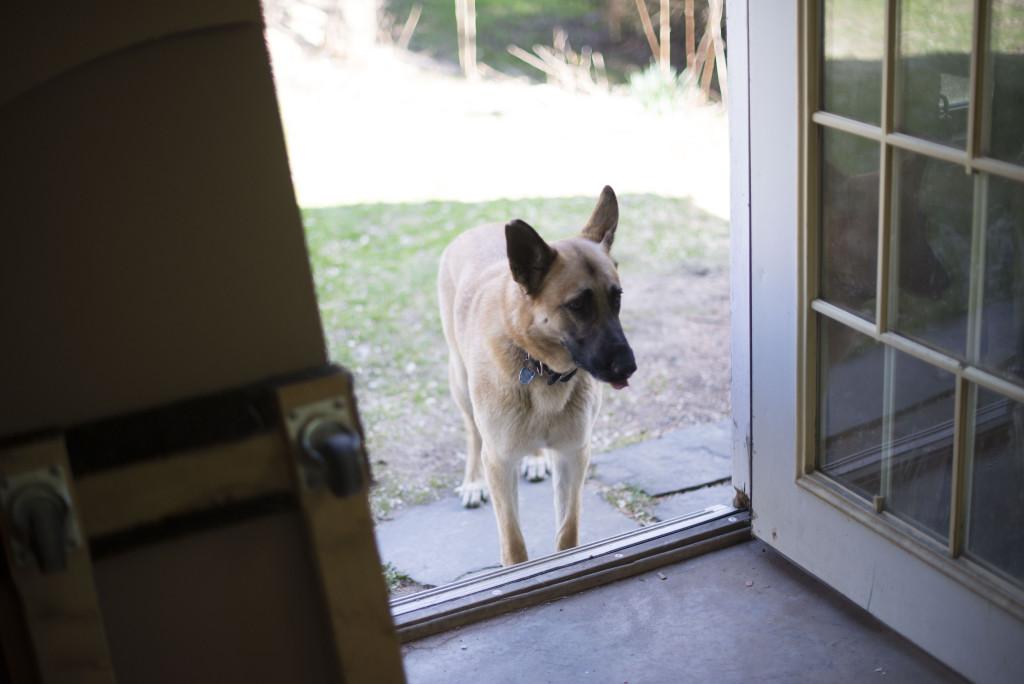
***
It’s the fall of 1988; Jim Nagel has just been named an artist-in-residence at the Genoa School, a woodworking academy that has opened in a small community just 25 minutes north of Ithaca. Jim has a bench-room in the newer wing of the building. There, he is free to work on projects of his choosing with fellow artists and students. It is also where he houses Peanut, a 4-month-old runt black lab he had inherited from his parents after a weekend home.
Genoa was unconventional. It was owned by a couple of former morticians, who were “gay but never said they were gay.” They came into some money and decided to try their hand at woodworking. They found an old, abandoned high school in upstate New York and opened up the academy.
Elizabeth Wolff has enrolled as one of just five students in the inaugural class. The students are given permission to select a space to live in for their first year in the program. She had only intended to register for the program; free housing was a bonus.
Liz, along with her fellow classmates, Todd and Laura, wander up the terrazzo stairway and walk the locker-lined former high school halls. Todd happens upon a large classroom with massive, paneled windows reaching all the way to the ceiling. Dusty wood floors anchor the space with only a few desks and bookshelves left behind. He has a vision; he would set this room up as his bachelor pad.
Laura, the only other enrolled female, finds a room similar to that of Todd’s. She and her Great Dane, Bindu, move in right away.
Although impressed by her classmates’ set-ups, Liz wants something more “cozy.” Wandering off on her own, she finds a teachers’ lounge.
“I’m going to put my bed in here,” she thinks to herself.
Complete with a half bath, the space is tiny. There isn’t much room for anything besides a bed and a small desk, all she would really need. Liz makes use of the lockers in the hall to store her things. She has found herself a home.
At night, long after classes have concluded for the day, Jim left for his apartment in Ithaca. Peanut remains in his bench-room because of his neighbors’ complaints about the dog’s behavior.
“I knew it wasn’t necessarily a solution,” Jim says. “But it was temporary.”
Liz and the residents of the Genoa School are left with the unruly puppy. Liz takes a liking to Peanut and visits her in the evenings. Laura, Bindu, Liz and Peanut take long walks around town. Bindu, a well-trained older dog, sets a good example for the rambunctious puppy.
Peanut’s nickname soon becomes “Dribble” because of her inability to “hold it.” The building is huge, so it takes time to get to the door to let her out. Running down the hall, a faint trail of urine forms behind her. But Liz is still endeared by the pup.
One rainy morning, Liz and her classmates head to Corning for a field trip. The group is piled into a rented van, and Liz is stuck next to the window. As they drive through the gloomy Southern Tier, a thought comes to her.
“I want to adopt her, I want to adopt Peanut. I’ve got to do it. I just love this dog.”
Upon arriving home from the trip, Liz tracks Jim down. She musters the courage to ask him, and to Liz’s pleasure he answers with a simple …
“… Yes.”
Jim is relieved on some level. He had been worrying about what to do with her for quite some time. He loved the dog, but knew he couldn’t provide the life Peanut so very longed for, and he liked Liz. He knew she would take care of her. And besides, Jim could still see Peanut
each day.
Liz renamed Peanut, Sybil (rhymes with “Dribble”). The two would walk to Pete’s IGA Grocery in town, where the butcher there would save leftover bones for Peanut, now Sybil. The hallways of the school would be littered with the chewed remnants. Liz would bounce rubber balls down the hallways as Sybil would bound down after them “almost cartoon-like.”
Sybil would bring Jim and Liz together. Not right away, but gradually. Jim would invite Liz over for dinner, where he would prepare some of his specialties.
“It was ‘Joy of Cooking!’” Jim says, justifying his frequent use of the popular Julia Child cookbook.
“You were known for your hamburgers, and you had a little toaster oven. And you were always making cacciatore,” Liz laughs.
“I was always up for a meal.”
From there the two started to “date.”
***
Jim and Liz are sitting in their apartment in Ludlowville. The Genoa School has gone bankrupt. Jim is reading the Ithaca Journal, the classifieds to be exact.
“Victorian Estate, 10 acres, pond, $40,000.”
“That’s our kind of price,” Liz responds, intrigued.
It is the winter of 1994 when the couple visits the property.
“It was a wreck …”
“… An absolute wreck.”
“No one had lived in it for a while.”
But that didn’t deter the prospective homeowners. With the help of a friend, the two were able to finance the home. They had been renting bench-room space at Hunt Hill in addition to working for a former teacher from the school. In whatever free time they had, they were making their new home habitable.
“We would get back to our apartment at 11 at night, there would often be a party in the backyard,” Liz says. “Jim would just lay down by the bonfire and fall asleep. He was exhausted from working so hard.”
The shop would come in 1997. Together the two would work to construct the building that would become home to their business, Wolff & Nagel Furniture. Two more renovations would follow bringing the shop to what it is today.
***
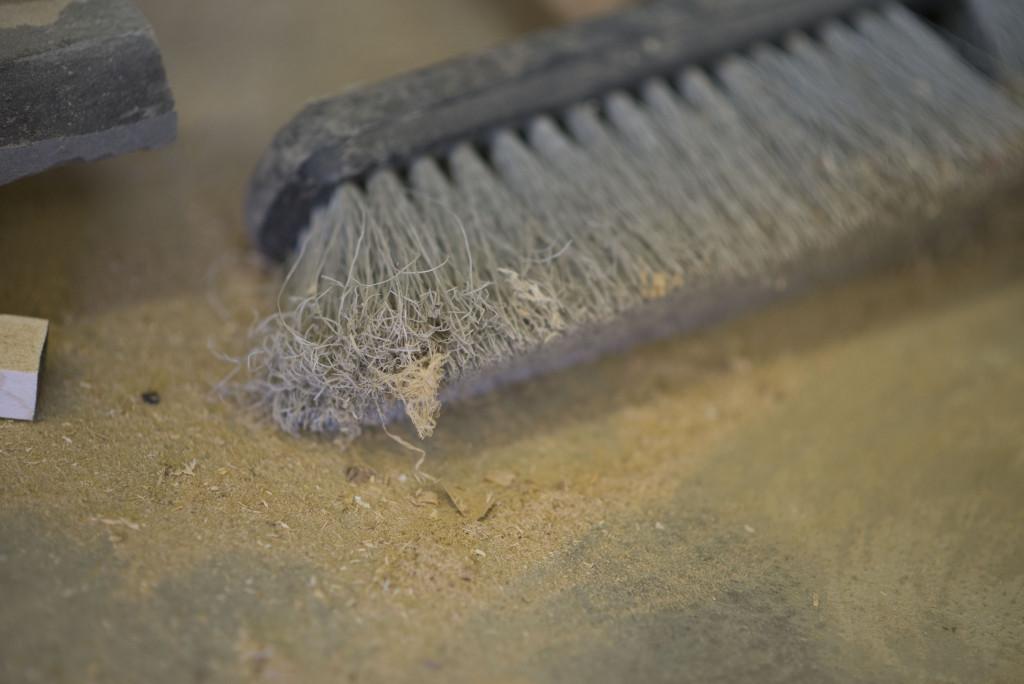
Jim grabs a piece of cherry. This will be a rail for a headboard. He secures the piece in a vise clamp and grabs a hand-planer from the shelf. He lines up the planer with the wood, and makes swift shifts over the top, fully extending his arms as he goes. Jim prefers the use of a hand-planer on a project such as this; perfecting a straightedge is just something no machine can do well.
He repeats this motion over and over until it has been made smooth. Small reddish brown curls litter the floor and with every motion he makes, his feet crush them flat beneath him.
He steps back and releases the vise’s grip, pulling the wood out. Checking for unevenness, he runs his calloused fingers over the edge. He sets this piece down, pleased, and looks over the pile before him.
“Hmm, let’s see.”
He picks out two pieces and bangs them together lightly to remove any dust before examining them closely.
***
“Blueeee. Blueeee.”
The name echoes in the valley as Jim calls nonchalantly for the dog to come to him. Jim knows the dog is smart, but lets him play his game anyway. This is a typical routine.
“Come on, Blue!” (pause) “Blueee!”
Birds chirp gleefully on this, the first of warm April days. Jim walks from the front of the shop to the rear, muttering in frustration as he goes. A flash of blond, fluffy tail flies across one of the side windows.
Blue is now in the pond. He has made eye contact with his owner, understanding that he wants something, but that doesn’t seem to change his mind. He splashes along the edge of the muddied winter water with a large stick clenched between his teeth. Jim stands on the bank of the pond begging the mutt one more time.
“Come on, get in here!”

Blue finally runs inside, unaware that he had been holding Jim up. Satisfied that the dog is now safely put away, Jim grabs a box full of supplies, a tape measure and a pencil before climbing into his dusty old Ford.
Jim has a meeting just over the hill, the problem being that there’s no road just over the hill. He must take a roundabout way to travel less than a mile or two. He makes a brief stop at the Slaterville Springs Post Office to send an application for an upcoming art show in Rochester. He climbs back into the driver’s seat, pops the shifter into drive and continues on. An empty Pure Life iced tea bottle sits in the cup holder, a pair of tattered work gloves rest on the dash and an unopened package of brown shoelaces sits on the armrest. He turns down another county road that leads to the jobsite
he’s seeking.
***
All sounds of work stop abruptly at noon. The radio takes over in the absence, playing “Stairway to Heaven,” which can be heard from every nook and cranny of the jobsite. The men leave their tools at their posts to take their lunch break.
“Hey!”
“Where you guys eatin’?”
“Oh, over on the side there.”
“I’m not gonna eat out here, that’s damn for sure. It’s wayyy too cold.”
Through the bare-bones entry, the doorway opens up into a vast great room. Intricate hardwood arches intersect at the center, framing a cathedral-esque ceiling. Scaffolding is set precariously for workers to reach even the highest points, but it is not without danger. One man scales the side cautiously, placing his paint-stained work boots with tentative purpose as he goes.
This isn’t new construction; it’s an add-on, more than doubling the original space of the property. The owners are sparing no cost in making this place sustainable; geothermal heating and two enormous solar panels are visible just beyond view from the upstairs bathroom window.
“Hi, Zoe.”
The homeowner stands in the entrance removing her coat. She wears faded gray jeans, a sweater and a floral scarf. She adjusts her auburn hair as her Pandora bracelet charms collide making a little jingle.
“Hey, Jim, how are you?”
“I’m well. Did you have a good trip to England?” Jim responds.
“Oh yeah, a little bit too short, but you know …”
As the introduction fades, Jim struggles to unroll the cumbersome blueprint he’s brought with him. Jim has been contracted to create an elaborate storage cabinet feature for the foyer of the home. This will be the primary point of entry, and Zoe wants to heighten the functionality of the space.
“Careful, it’s really bright! Don’t blind yourself. It’s happened to me before, and it’s like whoa!”
Zoe warns Jim as he attempts to plug in and turn on a construction lamp that’s been set up haphazardly in the dark foyer. The light comes on, filling the space with the clinical glow of a hospital emergency room. Zoe begins the discussion.
“From the drawings I saw on the computer …”
“OK.”
Jim makes direct eye contact with Zoe as she speaks, nodding his head in understanding.
“The only problem I’m seeing with it is on the interior …”
“Mhmm.”
He’s kneeling with his butt resting on his heels, his back arched over top of the plans before him.
“It doesn’t seem these closets are the right proportions.”
Zoe points with her polished finger to the drawing of two rectangular shapes before her.
“Alright.”
Jim takes his No. 2 pencil from behind his ear and uses it to trace what has already been drawn on the prints, pointing out the details that Zoe has come to appreciate.
“The wall looks nice. I like the wall.”
“Uh huh.”
“As you know, my husband had some extreme sticker shock after seeing the quotes from you.”
“Oh yeah.”
“You can just imagine what this place is costing us, twice as much as we originally thought.”
“And it’s the end of the job.”
This is the part that Jim is familiar with; when all the little costs start to add up. It’s finishing work, but this is what his job is all about. The details.
“I hate to go all discount on you because I can see this is extremely beautiful work.”
Jim pauses, not upset by the request, but in thought about how he can simplify the design. He suggests removing the storage above the cabinets and using basic hardware instead of the custom that the homeowners had intended. Zoe breaks the silence to share her vision for the space.
“You come in the door, you’re standing on a mat, you’re dripping with stuff. You open this door, you take your muddy boots off and there’s like slatted shelves right there to put them on. You take off your coat and there’s a drip tray below that you can take out and dump in the sink once it’s full. Then you close the door, and it’s like there’s nothing.”
Jim reassures her that what she wants will get done. They discuss the way in which the door should open and the finishing of the white oak door Jim will be constructing.
“It can be simpler. It can be just an angle; there can be a little chamfering. We can try to relate it more to the architecture; communicate the language of the beams.”
Zoe settles on a descriptor of the space, and Jim agrees.
“Handsome, not fancy.”
***
“I fully expected to be here full-time,” Liz says honestly. “I just took a civil service test and scored well, and I said to Jim ‘Health insurance, what do you think?’”
In 2001, Liz began work for the Department of Social Services. Since then, her presence in the shop has been restricted to nights and weekends. Now she works full-time with Cornell Cooperative Extension as a parenting educator, limiting her shop time even further.
“Depending on what’s going on, I’m less present with my current job than ever just because my job is getting bigger and bigger,” she notes.
Jim has taken the reigns for all of their contracted business. He is busy producing beds for Home Green Home, a sustainable home furnishings shop on The Commons, repurposing furniture for many of Cornell University’s fraternities and sororities and creating custom design work for clients throughout the greater Ithaca area.
“The problem with one big project is you lose your contact with others, and you can’t keep all your customers happy,” Jim says. “That’s what got us through the recession, being diverse.”
Liz says the challenge for her has become figuring out how she can reclaim her participation in the craft she loves.
***
Jim marks a line with a flimsy piece of contact board acting as a makeshift straightedge. He’s tapering a solid cherry leg for a bed.
He turns the bandsaw on. It runs without making contact for a few seconds as he gives the leg one more look up and down, placing it at eyelevel and closing one eye to get an upclose and personal view. He places the wood steadily onto the base of the saw as a high-pitched churning sound begins to resonate within the room. A fine dust shoots every which way as Jim continues to feed the piece into the blade. His pressure is constant and focused until, finally, the excess wood breaks free of the leg and hits the floor with a clatter.
He moves to the jointer. He turns it on and runs the edge he has just cut through. He does this five times, the rhythmic sound on the clank of the wood against the base, the buzz of the machine as the wood passes through and the knock of the safety guard sliding into place as he lifts the piece up.
Clank.
Buzz.
Knock.
He examines the pieces again. He moves back to the band saw, which he uses to finely scrape and smooth the edge. Jim holds the piece studying it, making sure he hasn’t missed any unnecessary bumps.
He looks up, content with his work, walks over to a table and places the finished product on it. He grabs another leg and moves back to the band saw; he still has three more to go.


